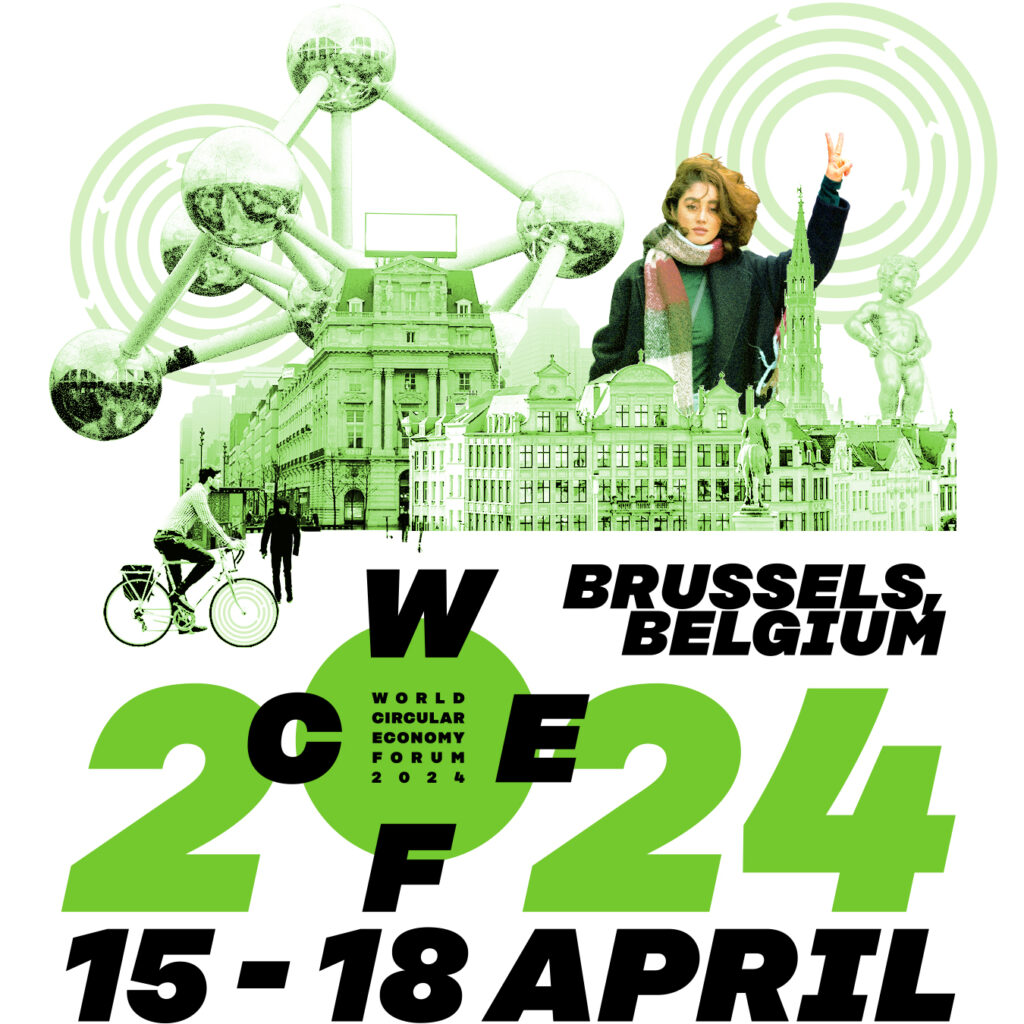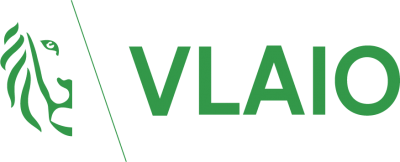Topics
We organise our actions in six thematic & strategic agendas:
Strategic Agendas:
Bio-economy
Circular Construction
Chemicals/Plastics
Manufacturing Industry
Food Chain
Water Cycles
Seven leverages provide additional support:
Leverage effects:
Lever Policy Instruments
Lever Circular Procurement
Lever Communication
Lever Innovation & Entrepreneurship
Lever Financing
Lever Jobs & Skills
Lever Research
What, why and how?
Why are we pursuing a circular economy?
Future visions 2050
How do we see our circular future?
About our management
Who steers what at Flanders Circular?
Relive the BE Circular Economy Forum 2024
Rewatch the plenary session with an energizing opening speech or the amazing key note and panel discussion. Relive the Belgian Circular Fashion Show. Or take a deepdive in the slidedecks of the many parallel sessions.
Opening speech
Panel discussion
The Belgian Presidency of the EU Council is pleased to play a pivotal role as a partner in the World Circular Economy Forum, reflecting the European Union's concerted efforts to transition towards a more sustainable and circular economy. To reach the climate goals a systemic change is needed and as President of the Council, Belgium will lead the European agenda towards a circular society at all levels of society and promote cooperation among the Member States to reach those goals.
During the WCEF2024 Circular Flanders, Walloon Region, Brussels Region and the federal government, will demonstrate how we evolved from experiments and frontrunners to a circular common practice in our companies, cities, knowledge institutes and citizens.
Program + slidedecks
| 8:30 - 9:30 |
Registration and Networking at SQUARE Brussels Meeting Centre
|
||
|
9:30 - 11:00
|
Plenary hosted by BE Presidency:
Download the slidedeck here.
What governance is needed to achieve a new economic system? How do we measure whether the transition is happening quickly enough and in the right direction? High level speakers will address critical aspects of advancing circular principles. This opening sets the foundation for a day filled with insights and inspiration. Chair of the Industry Competitiveness Council, Jo Brouns
Movie CE in Belgium Setting the scene - Hans Bruyninckx Panel - Moderator: Hanne De Coutere
Surprise act
|
||
| 11:00 - 11:30 | Break | ||
| 8:30 - 9:30 | Registration and Networking at SQUARE Brussels Meeting Centre |
| 9:30 - 11:00 |
Plenary hosted by BE Presidency:
What governance is needed to achieve a new economic system? How do we measure whether the transition is happening quickly enough and in the right direction? High level speakers will address critical aspects of advancing circular principles. This opening sets the foundation for a day filled with insights and inspiration. Chair of the Industry Competitiveness Council, Jo Brouns
Movie CE in Belgium Setting the scene - Hans Bruyninckx/Rebecca Nohl Panel - Moderator: Hanne De Coutere
Surprise act
|
| 11:00 - 11:30 | Break |
| 11:30 - 13:00 |
Systemic Innovation: Drivers for a more Circular Economy in Belgium and EuropeThe concept of a circular economy lies at the core of the innovation strategies across the three Belgian Regions. The imperative for groundbreaking, unconventional innovations, spanning both technological and non-technological realms (such as behavioural shifts), is essential at diverse levels to effectively propel the necessary shift. In this session research results, good practices and inspiring speakers will demonstrate the European systemic innovation. Download the slidedeck here.
Exemplarity law Sara Saqe - Brussels Economy and Employment Procuring Change: Navigating the Circular Economy Through a Strategic and Social LensPublic and private buyers play a pivotal role in promoting circular practices. The European Commission aims to mandate green procurement criteria in sectoral legislation, fostering circularity. Circular procurement, reported in the CSRD, aids private firms in achieving sustainability goals. Overcoming behavioural challenges is key. This session explores cases where authorities and companies successfully adopted social and circular procurement. Download the slidedeck here.
Welcome by Maria Nikolopoulou, EESC member
Panel 1: Vision and Strategic Implementation of Circular Procurement PracticesStrategic procurement vision -Frank Geets, Het Facilitair Bedrijf:
Embracing Circular Manufacturing: Adopting Repair SolutionsManufacturing and repair will play a pivotal role in a global, circular economy. Various EU member states have experimented, learned, failed – but also succeeded. It is time to take stock of what works – and what can be scaled up to make repair truly mainstream. We’ll cover policies, business models, technology, skills and design for repair as fundamental transition paths. In a co-creative session, we let stakeholders and Member States learn and leap. Download the slidedeck here.
Introduction The socio-economic effects of a strong repair economy - Cristina Ganapini, The Right to Repair Campaign
Testimonials
Followed by an interactive panel debate featuring the same speakers. Mastering reuse of plastics in the circular economy?Plastics can play a role in the future circular economy, but we will have to deal with this material carefully, minimizing impact on people and the environment.
Setting the scene: plastics in the circular economy, Werner Annaert, OVAM
Keynote: Making reuse the new normal, Els Dubois, University of Antwerp – ReuseLab Retailer launches shelf ready returnable sixpacks, Tine De Pooter, DW Reusables and Lotte Krekels, Carrefour Together building the Care Square, Ann Van Den Bosch, EnAdviS bv and Nick Sablon, Roche Diagnostics Belgium Reducing single-use materials in medicine and healthcare - Evelien Kieckens, UZ Gent From “reuse being impossible” to “reuse delivering value”, Tom Domen, Made Moderators: Luk Umans and Els Herremans, OVAM Company visits in Brussels (Fully booked)Route 1: Circularium - Konligo – Dreamkitchen
Departure at 11:00 at SQUARE, return around 14:00 (lunch at Dreamkitchen)
Route 2
|
| 14:30 - 16:00 |
Information Flows in a Circular Economy: Monitoring, Metrics, and Digital EvolutionTwo focal themes within CE are the development of monitoring instruments and the potential of the digital transformation. What essentially binds these two themes are the search for and the needs of information. For this session we will highlight case studies about CE monitoring at country/regional level, at the city level, circularity assessments for companies, developments of digital product passports and more. Download the slidedeck here.
Keynote Information in a Circular Economy, Karel Van Acker, CE Center
Panel 1:
Panel 2: Circular Hubs: Multilevel Approach Creating Impact in PracticeThe European Circular Economy Action Plan was a necessary legal step, but for a complete economic transformation, specific accelerator mechanisms like circular hubs are necessary. They embody a decentralised capacity for orchestration along the value chains and across geographical/administrative levels. The emergence of different types of circular hubs expresses the functional needs for system innovation: information and knowledge sharing, business development and partnering, industrial and logistic focal points and more. Download the slidedeck here.
Introduction by Ladeja Godina Košir - Founder and Executive Director @Circular Change & Co-Chair European Circular Economy Stakeholders Platform
Pitches
Panel
Moderators: Brigitte Mouligneau - Transition Manager Circular Economy -@Circular Flanders and Luca Polidori – Program Manager Circular Economy Hubs @Holland Circular Hotspot Challenges and opportunities of the European Circular Economy Battery IndustryThe session provides an in-depth exploration of the latest European advancements in circular battery technology. It delves into the regulatory landscape, spotlighting key objectives and targets for circularity and recycling. Through the presentation of three concrete business cases from European pioneer companies working on recycling, reuse and digital product passports, and a research point of view, it aims to illuminate success stories, while also offering a reality check on the practical applications of the set objectives. Slidedeck coming soon.
Towards a Circular Built Environment using Bio-Based and Reclaimed materialsThis session will take construction professionals through the learnings of European projects on improving the building process and design principles to drive the uptake of reclamation and reuse of building materials and components. Another challenge is the difficulty for biobased construction materials to be seen as equivalent for customary materials. Via several European cases this session will demonstrate how circular construction can become the new normal. Download the slidedeck here.
Setting the Scene
Panel on Reuse, Reduce and Biobased construction materials
Closing word by Anders Ladefoged, EESC member Company Visits Wallonia and Flanders (Fully booked)Company Visits Flanders
Werfheide: circular hub run by 28Rond ngo. In this circular hub you can find the following the following social-circular business and initiatives:
De Recupperij: circular hub run by Ecoso, where you can find the following social-circular businesses:
Departure at 14:00 at SQUARE (after lunch), return around 17:30.
Departure at 14:00 at SQUARE (after lunch), return around 17:30. |
|
11:30 - 13:00 Systemic Innovation: Drivers for a more Circular Economy in Belgium and EuropeThe concept of a circular economy lies at the core of the innovation strategies across the three Belgian Regions. The imperative for groundbreaking, unconventional innovations, spanning both technological and non-technological realms (such as behavioural shifts), is essential at diverse levels to effectively propel the necessary shift. In this session research results, good practices and inspiring speakers will demonstrate the European systemic innovation. Download the slidedeck here.
Exemplarity law Sara Saqe - Brussels Economy and Employment Procuring Change: Navigating the Circular Economy Through a Strategic and Social LensPublic and private buyers play a pivotal role in promoting circular practices. The European Commission aims to mandate green procurement criteria in sectoral legislation, fostering circularity. Circular procurement, reported in the CSRD, aids private firms in achieving sustainability goals. Overcoming behavioural challenges is key. This session explores cases where authorities and companies successfully adopted social and circular procurement. Download the slidedeck here. Welcome by Maria Nikolopoulou, EESC member Panel 1: Vision and Strategic Implementation of Circular Procurement PracticesStrategic procurement vision -Frank Geets, Het Facilitair Bedrijf:
Embracing Circular Manufacturing: Adopting Repair SolutionsManufacturing and repair will play a pivotal role in a global, circular economy. Various EU member states have experimented, learned, failed – but also succeeded. It is time to take stock of what works – and what can be scaled up to make repair truly mainstream. We’ll cover policies, business models, technology, skills and design for repair as fundamental transition paths. In a co-creative session, we let stakeholders and Member States learn and leap. Download the slidedeck here.
Introduction The socio-economic effects of a strong repair economy Cristina Ganapini, The Right to Repair Campaign Testimonials
Followed by an interactive panel debate featuring the same speakers. Mastering reuse of plastics in the circular economy?Plastics can play a role in the future circular economy, but we will have to deal with this material carefully, minimizing impact on people and the environment. Setting the scene: plastics in the circular economy, Werner Annaert, OVAM Keynote: Making reuse the new normal, Els Dubois, University of Antwerp – ReuseLab Retailer launches shelf ready returnable sixpacks, Tine De Pooter, DW Reusables and Lotte Krekels, Carrefour Together building the Care Square, Ann Van Den Bosch, EnAdviS bv and Nick Sablon, Roche Diagnostics Belgium Reducing single-use materials in medicine and healthcare - Evelien Kieckens, UZ Gent From “reuse being impossible” to “reuse delivering value”, Tom Domen, Made Moderators: Luk Umans and Els Herremans, OVAM Company visits in BrusselsRoute 1: Circularium - Konligo – Dreamkitchen
Departure at 11:00 at SQUARE, return around 14:00 (lunch at Dreamkitchen)
Route 2
|
|
14:30 - 16:00 Information Flows in a Circular Economy: Monitoring, Metrics, and Digital EvolutionTwo focal themes within CE are the development of monitoring instruments and the potential of the digital transformation. What essentially binds these two themes are the search for and the needs of information. For this session we will highlight case studies about CE monitoring at country/regional level, at the city level, circularity assessments for companies, developments of digital product passports and more. Download the slidedeck here. Keynote Information in a Circular Economy, Karel Van Acker, CE Center Panel 1: Panel 2: Circular Hubs: Multilevel Approach Creating Impact in PracticeThe European Circular Economy Action Plan was a necessary legal step, but for a complete economic transformation, specific accelerator mechanisms like circular hubs are necessary. They embody a decentralised capacity for orchestration along the value chains and across geographical/administrative levels. The emergence of different types of circular hubs expresses the functional needs for system innovation: information and knowledge sharing, business development and partnering, industrial and logistic focal points and more. Download the slidedeck here. Introduction by Ladeja Godina Košir - Founder and Executive Director @Circular Change & Co-Chair European Circular Economy Stakeholders Platform Pitches
Panel
Moderators: Brigitte Mouligneau - Transition Manager Circular Economy -@Circular Flanders and Luca Polidori – Program Manager Circular Economy Hubs @Holland Circular Hotspot Challenges and opportunities of the European Circular Economy Battery IndustryThe session provides an in-depth exploration of the latest European advancements in circular battery technology. It delves into the regulatory landscape, spotlighting key objectives and targets for circularity and recycling. Through the presentation of three concrete business cases from European pioneer companies working on recycling, reuse and digital product passports, and a research point of view, it aims to illuminate success stories, while also offering a reality check on the practical applications of the set objectives. During the panel discussion, speakers and audience will explore some of the most imminent dilemmas and discuss key challenges in terms of technological developments, environmental and social aspects, policy coherence, trade concerns and financial viability of circular battery business models throughout the battery value chain. Slidedeck coming soon.
Towards a Circular Built Environment using Bio-Based and Reclaimed materialsThis session will take construction professionals through the learnings of European projects on improving the building process and design principles to drive the uptake of reclamation and reuse of building materials and components. Another challenge is the difficulty for biobased construction materials to be seen as equivalent for customary materials. Via several European cases this session will demonstrate how circular construction can become the new normal. Download the slidedeck here. Setting the Scene Panel on Reuse, Reduce and Biobased construction materials Closing word by Anders Ladefoged, EESC member Company Visits Wallonia and FlandersCompany Visits Flanders Werfheide: circular hub run by 28Rond ngo. In this circular hub you can find the following the following social-circular business and initiatives:
De Recupperij: circular hub run by Ecoso, where you can find the following social-circular businesses:
Departure at 14:00 at SQUARE (after lunch), return around 17:30.
Departure at 14:00 at SQUARE (after lunch), return around 17:30. |
| 16:00 - 17:30 |
Closing drink & matchmaking |
||
| 16:00 - 17:30 Closing drink & matchmaking |
Circular Fashion show
Check out the blogpost with all brands and their circular practices.



















